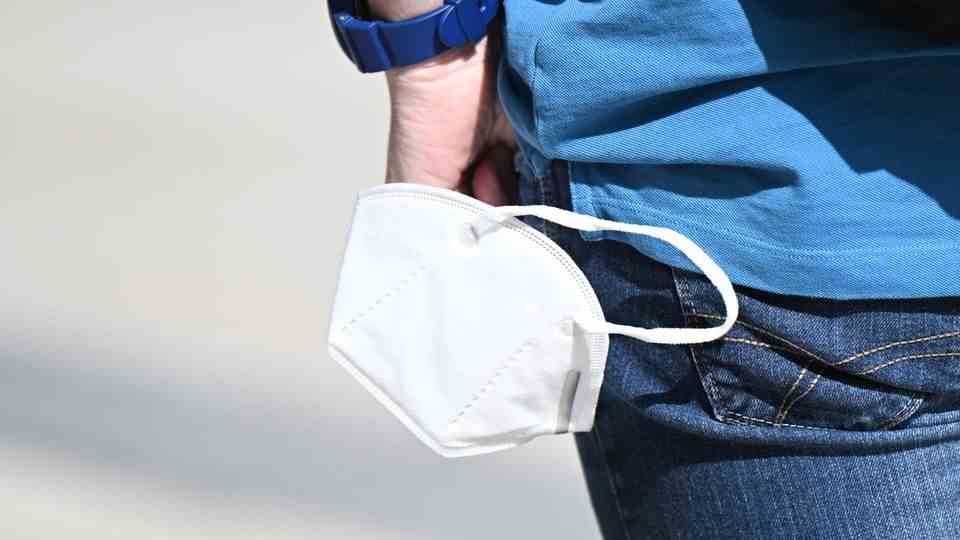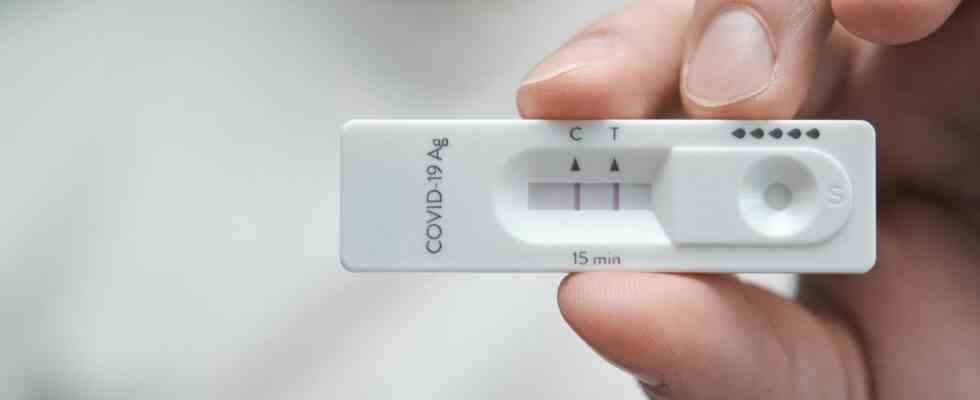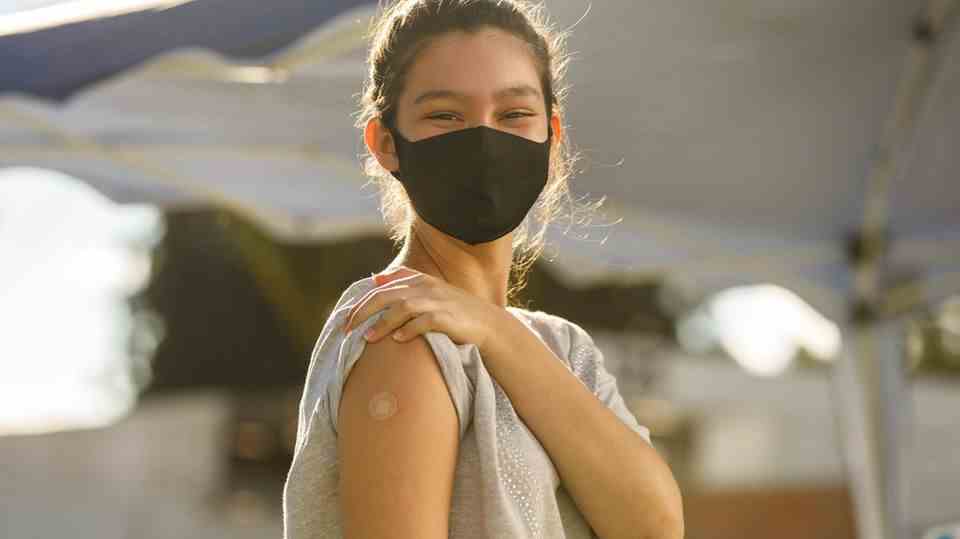More and more people in Germany are becoming infected with the omicron variant. Some have even had a corona infection twice. But how big is the risk of this so-called reinfection?
Since Omikron has been spreading more and more in Germany, tens of thousands of people have been infected with the corona virus every day. More and more have recovered. Many assume that this protects them from re-infection, a so-called reinfection. But it’s not that easy. It is possible to become infected again after surviving a corona infection. But why is that? The most important questions and answers at a glance.
How big is the risk of a renewed corona infection?
Whether you become infected again after surviving an illness with Sars-CoV-2 depends on several factors. For example, previous illnesses, age, corona vaccinations and your own immune status. In addition, scientists now see a certain connection between a renewed Covid 19 infection and the course of the disease. In the case of mild or asymptomatic courses of a corona infection, only a few antibodies are often formed or the antibody concentration decreases again very quickly, explains Prof. Martina Prelog. She is an immunologist and specialist in paediatrics and youth medicine from the University Hospital in Würzburg.

Martina Prelog is an immunologist and specialist in paediatrics and youth medicine from the University Hospital of Würzburg.
© private
In the immune system, the B cells are responsible for producing antibodies. In order to produce particularly good antibodies, time is a factor for the immune system. In mild cases, so few virus particles remain in the body that the immune system does not have time to deal with them sufficiently. The antibody count then drops rapidly. Therefore, reinfections are more likely with low antibody levels. “If there is more time for maturation, the B cells that produce the best antibodies can be selected. This is called avidity maturation. These antibodies bind particularly well to viruses and can even protect against new virus variants of Sars-CoV-2,” says the immunologist.
Another point: “A high concentration of antibodies is also related to the level of neutralizing antibodies. Such antibodies bind in a very specific way to a virus surface molecule that the coronavirus needs in order to be able to penetrate the cells at all. So the antibodies prevent the viruses from efficiently infecting cells,” explains Martina Prelog.
So a high number of antibodies protects against reinfection?
In addition to B cells, T cells are another important pillar of the immune system. Cytotoxic T cells seek out cells infected by the coronavirus in order to destroy them and prevent the virus from spreading further in the body. Helper T cells assist the antibody-producing B cells and the innate immune system in eliminating the virus. The immunologist says: “Even in people with mild courses who did not have a high antibody concentration, we were able to observe a very good T cell response against Sars-CoV-2. This means they can be well protected against severe infections with Covid-19. ” This means that whether people who have had a mild course are more likely to get a reinfection depends not only on the antibody concentrations, but also on the T cells, which are usually good enough in people with a fit immune system to not make the person difficult getting sick, summarizes Prelog.
How often does reinfection occur?
The UK Health Security Agency report from late March said there had been more than 804,000 reinfections in England since the pandemic began. Reinfections are defined as two positive corona tests at least 90 days apart. The Robert Koch Institute does not collect any reporting data on reinfections, as requested by the star communicates.
If I have already been infected with Omikron in the last few months, can I get infected again with the same or a new Omikron variant?
Anyone who has been infected with Omicron in the last few months can become infected again with the same variant. Reinfections by the omicron subvariant BA.2 after infection with the subvariant BA.1 are also currently being observed, says Prelog. In a Danish preprint, researchers examined 1.8 million Covid cases. Genome sequencing confirmed reinfection with BA.2 after previous BA.1 infection in 47 cases. According to the study, younger, unvaccinated people in particular could be re-infected with BA.2 after infection with subvariant BA.1.
What protection does vaccination or recovery offer?
According to a study from the USA, the probability of being infected again is more than twice as high for those who are not vaccinated than for those who have recovered and who are also fully vaccinated.
For two years, researchers tracked the immunity of those who had been vaccinated and those who had recovered. Martina Prelog also worked on this study. The main result: The immune system must have come into contact with the coronavirus three times – for example through vaccination and/or infection – in order to build up good protection. Being protected from Covid-19 means protection from a serious infection with all the individual and social consequences (Long Covid, secondary diseases, complications, death, overloading the health system, absence from work, etc.), says Prelog. “There are indications that a “hybrid immunity”, i.e. ideally infected and then vaccinated twice (but vice versa is also possible), generates the best immune response. However, the triple vaccination is in no way inferior to the hybrid immunity in terms of the level of antibodies .” In contrast to a vaccination, however, an infection cannot be calculated and its effects are less easy to assess, which is why it should be avoided.
The immunologist emphasizes that it is of great importance for immunity that the immune system has enough time to be able to select the B cells that produce the best antibodies. Antibody protection lasts at least six months in people with an intact immune system. “For long-term protection against Sars-CoV-2, it is relevant that long-lived plasma cells develop that form antibodies against Sars-CoV-2. These would also provide us with protective antibodies for years and ideally for life. Long-term studies are currently being carried out on this, whether this is also the case with Sars-CoV-2,” explains Prelog.

Is renewed corona infection usually milder?
Repeated infection with Covid-19 is usually milder in people with a healthy immune system. But that depends on the variant and the time of reinfection. “The average protection against reinfection within six months after a Sars-CoV-2 infection (with alpha or delta) fell from 85 percent to 0 to 27 percent, as figures from England show. However, the built-up T -cells usually against more severe courses, but not against an infection,” reports Prelog. The data on the severity of reinfections is very mixed, because many people have now been vaccinated and the immunity is also better as a result of the vaccination and the infections are therefore milder.
What role does the omicron variant play in reinfection?
Omicron does not produce as strong an immunity as Delta, as suggested by studies. Especially after mild or asymptomatic omicron courses, says immunologist Martina Prelog. Since the appearance of the omicron variant, there have been many more reinfections. Figures from the UK illustrate: The risk of reinfection was about 10 times higher during the period when omicron was dominant (20 December to 20 March 2022) than during the period when the delta variant was dominant (17 May to 19 December). 2021), according to the statistics authority in Great Britain (Office for National Statistics). A study based on data from Qatar paints a similar picture. A previous infection protects only 56 percent against reinfection with Omikron. For comparison: the Delta variant is 92 percent.
Sources: Study immunity of vaccinated and recovered, study qatar,Preprint Denmark, Office for National Statistics, UK Health Security Agency report, study from the USA


